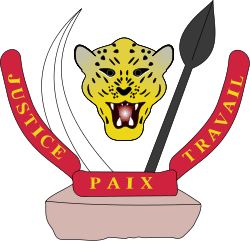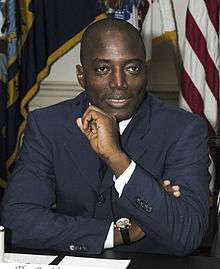Democratic Republic of the Congo general election, 2011
| | |||||||||||||||||||||||
| |||||||||||||||||||||||
| |||||||||||||||||||||||
| |||||||||||||||||||||||
 |
| This article is part of a series on the politics and government of the Democratic Republic of the Congo |
|
Government |
|
Judiciary |
| Foreign relations |
| United Nations Mission |
Presidential and parliamentary elections were held in Democratic Republic of the Congo on 28 November 2011; a facultative run-off on 26 February 2012 was shelved with a change in election laws.[1][2]
The government passed laws to abolish the second round of the presidential election and tried to change the legislative electoral system from proportional to majority representation, which has been strongly criticised by the opposition.[3][4]
Concerns have been raised about the transparency of the elections by a number of international organizations, which have called for an increase in the number of observers.[5][6] Criticism has also been raised about the neglect of international organizations, namely the United Nations and the European Union in their support for the elections in the DR Congo.[7]
On 8 November 2011 opposition leader Étienne Tshisekedi declared himself president saying the majority of people turned against President Kabila.[8]
On 28 November 2011 elections were held under difficult conditions. There were incidents of violence throughout the country and chaotic voting.[9] Because of violence and delays in the delivery of ballot boxes elections were extended by a second day.[10]
Candidates
- Jean Andeka (ANCC)
- Adam Bombolé (independent)
- Joseph Kabila (independent)
- François Nicéphore Kakese (URDC)
- Vital Kamerhe (UNC)
- Oscar Kashala (UREC)
- Léon Kengo (UFC)
- Antipas Mbusa (independent)
- Nzanga Mobutu (Udemo)
- Josué Alex Mukendi (independent)
- Étienne Tshisekedi (UDPS)
Registration
DR Congo's National Independent Electoral Commission has registered 32 million voters for the November elections.
| Province | Registered voters |
|---|---|
| Kinshasa | 3,287,745 |
| Bas-Congo | 1,502,939 |
| Bandundu | 3,553,322 |
| Equateur | 3,960,643 |
| Orientale | 3,886,524 |
| North Kivu | 3,003,246 |
| South Kivu | 2,022,960 |
| Maniema | 874,809 |
| Katanga | 4,627,302 |
| Kasai Oriental | 2,643,905 |
| Kasai Occidental | 2,661,245 |
| Total | 32,024,640 |
Results
.jpg)
.jpg)
.jpg)

First results released on 2 December 2011, with 15% of the vote counted (mostly in areas considered Kabila strongholds), gave Kabila only a narrow lead of 940,000 votes (52%) against 912,000 votes (34%) for UPDS leader Tshisekedi;[11] Vital Kamerhe had 4.5% of the votes.[12]
With half the precincts counted, President Joseph Kabila was leading with 4.9 million votes, or nearly 49%. His opponent Etienne Tshisekedi was trailing with 3.4 million votes, about 34%.[13] However, this count did not include much of Kinshasa, where Tshisekedi was expected to have strong results. Kabila recently ceased all email and sms services nationwide. It is also said that over 5.000.000 of pre ticked ballot papers for the number 3 candidate (kabila), However no formal actions were taken by the CENI, which led to the population to act as they burned pre ticked ballot papers that were found.[14]
The announcement of final results was postponed to 8 December 2011; with over two thirds of the vote counted, Kabila led with 46% to Tshisekedi's 36%.[15]
The Independent National Electoral Commission declared Kabila as the winner on December 9. The result was put into question by the Carter Center as well as the archbishop of Kinshasa, Cardinal Laurent Monsengwo Pasinya, claiming too many irregularities occurred to assure that the results reflected the will of the people.[16] The Carter Center indicated that ballots had been missing in some areas while in others Kabila achieved unrealistic results.[16] Observers from the Carter Center noted that in some districts voter participation was reported to be 100 percent, a most unlikely possibility.[17] MONUSCO, the peacekeeping mission of the United Nations, also voiced concern about the results.[17]
While Kabila admitted that some mistakes had been made in the process, he rejected concerns about the outcome. The result was confirmed by the Supreme Court of the Democratic Republic of Congo.[18]
Jerome Kitoko, President of the Supreme Court, announcing the official results proclaimed Kabila to be the winner of the Presidential election.[18][19]
| Candidate | Party | Votes | % |
|---|---|---|---|
| Joseph Kabila | Independent | 8,880,944 | 48.95% |
| Étienne Tshisekedi | Union for Democracy and Social Progress | 5,864,775 | 32.33% |
| Vital Kamerhe | Union for the Congolese Nation | 1,403,372 | 7.74% |
| Léon Kengo | Union of Forces of Change | 898,362 | 4.95% |
| Antipas Mbusa | Independent | 311,787 | 1.72% |
| Nzanga Mobutu | Union of Mobutuist Democrats | 285,273 | 1.57% |
| Jean Andeka | Alliance of Congolese Nationalist Believers | 128.820 | 0.71% |
| Adam Bombolé | Independent | 126,623 | 0.70% |
| François Nicéphore Kakese | Union for the Revival and the Development of Congo | 92,737 | 0.51% |
| Josué Alex Mukendi | Independent | 78,151 | 0.43% |
| Oscar Kashala | Union for the Rebuilding of Congo | 72,260 | 0.40% |
| Total (turnout 58.81%) | 18,911,572 | 100.00% | |
| Source: CENI-RDC | |||
In the parliamentary election, with 432 of 500 seats declared, Kabila's People's Party for Reconstruction and Democracy (PPRD) had 58 seats and Tshisekedi's Union for Democracy and Social Progress (UDPS) 34 seats. Allies of the PPRD gained 106 seats, and with other new parties known to support Kabila, he likely will have 200 seats supporting him; he will still need to reach out for more partners, however, to gain a majority. Almost 100 parties are expected to be represented in the parliament. Most of the undeclared seats are in Kinshasa and are likely to go to the opposition.[20]
Aftermath
The rebels in the 2012 East D.R. Congo conflict said Kabila was not the legal winner of the election and must resign.
References
- ↑ Kavanagh, Michael J. (2011-04-30). "Congo Electoral Commission Says Presidential Elections to Be Held Nov. 28". Bloomberg.
- ↑ http://english.peopledaily.com.cn/90001/90777/90855/7099927.html
- ↑ "DR Congo opposition anger over electoral changes". BBC News. 2011-01-10.
- ↑
- ↑ http://freefairdrc.com/en/about/role-of-observers
- ↑ http://www.crisisgroup.org/en/regions/africa/central-africa/dr-congo/B80-congo-the-electoral-process-seen-from-the-east.aspx
- ↑ http://politicsinspires.org/2011/11/how-are-election-preparations-unfolding-in-the-democratic-republic-of-the-congo-drc-hope-or-failure-two-perspectives
- ↑ http://www.csmonitor.com/World/Africa/Africa-Monitor/2011/1108/Congolese-candidate-Tshisekedi-declares-himself-president
- ↑ http://www.english.rfi.fr/africa/20111128-day-chaotic-voting-drc-elections
- ↑ Rukmini Callimachi (2011-11-29). "Congo Elections 2011: Vote Extended To Second Day". Huffington Post. Retrieved 2011-11-29.
- ↑ "DR Congo election: Kabila guards 'shot UDPS supporters'". BBC News. 2011-12-02.
- ↑ http://derstandard.at/1322531790681/Teilergebnisse-der-Wahl-bekanntgegeben
- ↑ Dread permeates Congo ahead of election results, Kabila in lead with 49 percent
- ↑ https://www.google.com/hostednews/ap/article/ALeqM5ipXVKU789GdE5omsWQN4h5o0nPXw?docId=700127f6203d4a7f82be1bf20e0122c6
- ↑ "DR Congo election results delayed by 48 hours". BBC News. 2011-12-07.
- 1 2 Adam Nossiter (December 12, 2011). "Congo President Kabila Denies Reports of Election Fraud". New York Times. Retrieved December 12, 2011.
- 1 2 Associated Press (2011-12-12). "Criticism grows over Congo election results". Washington Post. Retrieved 2011-12-16.
- 1 2 "DR Congo election: Joseph Kabila confirmed as winner". BBC News Africa. 2012-12-16. Retrieved 2012-12-16.
- ↑ Congo News Agency (2011-12-16). "Supreme Court Rules Joseph Kabila Won Presidential Election". Congo Planet. Retrieved 2011-12-17.
- ↑ "Congo poll: Etienne Tshisekedi condemns results". BBC News. 2012-01-27.

